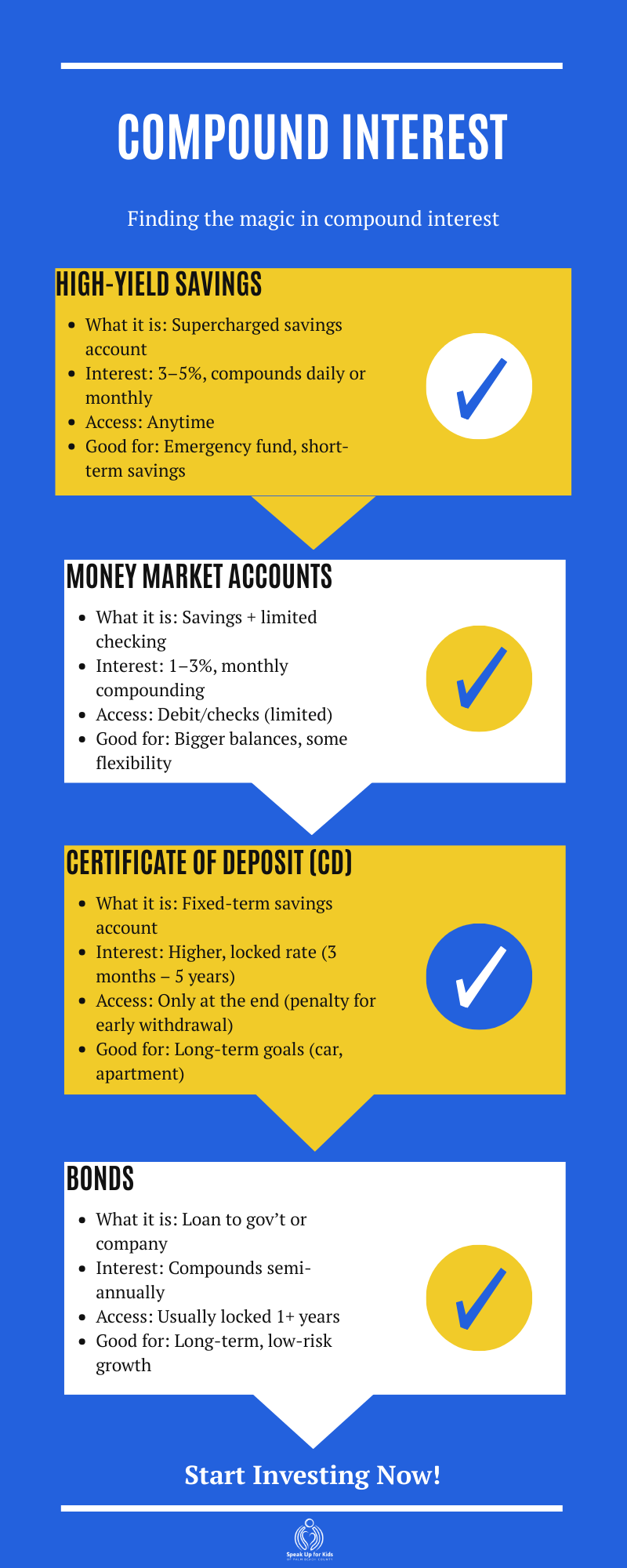The Power of Compound Interest: How Your Money Can Work for You
Contributed by Jack Feuerberg — a Students Speak Up for Kids Volunteer.
Overview
What if you had the ability to make money while you were sleeping? Compound interest presents an opportunity for your wealth to grow without having to actively work for it. This guide will teach you how compound interest will make your money work for you and the best ways to take advantage of compound interest.
What is Compound Interest?
Compound interest is the ability to earn interest on both your initial investment and the interest it has already accrued. When you lend money or deposit it in a bank, you earn interest as a payment for allowing them to use your money. The foundation of compound interest is that your money grows based on your initial investment plus the interest it has already earned.
Simple Interest vs. Compound Interest Over Time
While interest is an incredible asset, allowing your money to grow with compound interest will significantly increase the amount of growth seen in your wealth. Let’s break it down:
Simple Interest:
Formula: Principal Amount (initial investment) x Interest Rate x Time Period
$1,000 invested at a rate of 5% for three years: $1,000 x 0.05 x 3 = $150
Total Amount Earned: $150
Compound Interest:
Formula: Principal Amount x (1 + Rate of Return/Number of times compounded per year)^Number of times compounded per year x Time Period
$1,000 invested at a rate of 5% for three years compounded annually:
Year 1: $1,000 × 1.05 = $1,050
Year 2: $1,050 × 1.05 = $1,102.50
Year 3: $1,102.50 × 1.05 = $1,157.63
Total Amount Earned: $157.63
Although $7.63 may seem like a small difference, this will continue to grow over the years. Additionally, the more money that is initially invested, the larger the sum will be. Compound interest clearly proves more helpful than simple interest, but where can compound interest be achieved?
Where Can You Earn Compound Interest?
High-Yield Savings Accounts (HYSAs): A high-yield savings account (HYSA) works like a regular savings account but offers a higher interest rate. A HYSA offers a safe place to keep your money while earning a large amount of interest on it. These accounts are perfect for long-term savings and emergency funds. You can find a HYSA at banks such as Ally Bank, American Express, and Discover Bank.
Money Market Accounts (MMAs): Money Market Accounts are typically considered a mix between a savings and checking account. An MMA offers the best of both worlds as it allows for a higher interest rate than a typical savings account while still giving flexibility and access to your money, similar to a checking account. A money market account is perfect for someone who still wants to earn interest on their money while still having access to it. You can find a money market account at most banks and credit unions.
Bonds: Bonds are essentially a loan made by an investor to a borrower. This borrower can be a private company or the government. Bonds offered by private and public companies are considered corporate bonds. Bonds offered by government agencies are considered municipal bonds, and bonds offered by the U.S. Treasury are called U.S. Treasuries. All of these bonds come with different levels of risk and interest rates. Bonds are typically considered a safer investment than stocks, and they act as a stable investment. However, many bonds can have a certain hold time.
Certificate of Deposit (CD): A certificate of deposit is a type of savings account that can be found at many banks and credit unions. A CD allows you to earn a fixed amount of interest on your money for an agreed-upon amount of time. A CD locks in your money for an agreed-upon term and earns interest at a fixed rate, regardless of market fluctuations. A CD can be a perfect investment for someone who is looking for a risk-free investment that does not require access to the money. There are different options for CDs, with some offering increased interest.
The Importance of Starting Now
A key factor to investing is that time is the best asset. With compound interest, the time you start investing is often more important than the amount you start with. It is crucial to start investing now rather than waiting for “the perfect time.” No matter how much money you have to start, start investing now!


